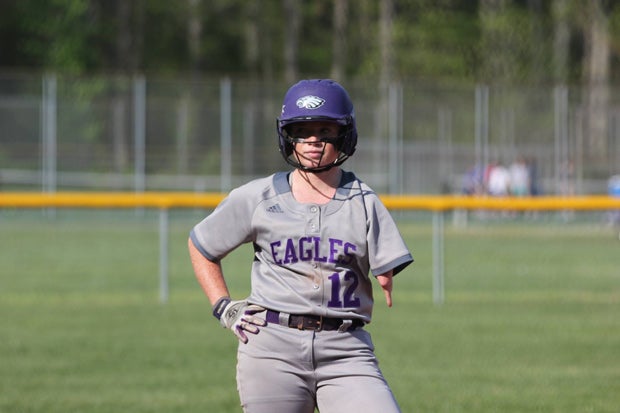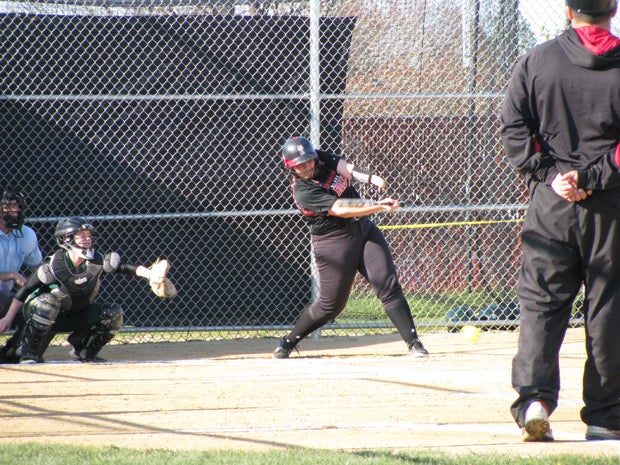Video: One-handed softball star Kim Basile
See CBS New York news story on remarkable softball player Kim Basile.Kim Basile and
Katelyn Pavey were the last ones in their elementary school classes to learn to tie their shoes. Sometimes they still have problems with zippers.
"My kindergarten teacher sent a note home with me to my parents suggesting they ‘buy a pair of velcro shoes,' because (I) ‘wasn't going to tie my shoes every day,'" recalled Pavey, an all-league centerfielder for
Lanesville (Ind.).
"Can't isn't an option in our house, so when I got home and showed my dad the note ... we stayed up until I could tie my own shoes."
Basile said, "Like a lot of things, I just practiced (tying my shoes) a lot."
Basile, who plays for
Island Trees (Levittown, N.Y.), was named all-County two weeks ago and will play next year for Farmingdale State College on Long Island. Pavey, who recently completed her junior year, is being recruited by three colleges and expects more to follow during her summer season.
Both have very strong throwing arms, are among the leading hitters on their teams and neither has made an error this season. They are both team captains as well. Basile is on the school bowling and volleyball teams and plays trumpet in the marching band. Pavey, who also pitches, plays basketball and used to play volleyball.
But Basile and Pavey certainly aren't your everyday softball players. They are "limb-different" softball players. Basile has one hand and Pavey has one arm.
Basile's left arm is similar to former Major League pitcher Jim Abbott. It's a birth defect known as amelia. She has no left hand, as the arm stops a few inches below her elbow. Pavey was born with phocomelia, or basically half an arm. She has two digits on her left arm, which ends a little above her elbow.
They each catch and throw with their right arm and hand. They also bat one-handed. With a little more arm than Pavey, the right-handed hitting Basile hits with more power. She uses her left arm to guide the bottom of the bat during her swing to generate power.
Pavey, who bats lefty, bunts, slaps and can drive the ball with her one-arm swing.

Katelyn Pavey has one more season to impress college programs as a prep player at Lanesville.
Courtesy photo
Many people call them handicapped, and many who see them say they are an inspiration.
Neither sees herself as handicapped.
"I don't see myself as a disabled person, I learn to do things for myself," said Basile. "I don't like to ask for help with things, so I try to figure things out myself. I want to be independent."
Basile blushes when people tell her she is an inspiration.
"It rocks my world when they say that," Basile said. "It's just my everyday world. It is what's normal to me ... it's always been that way."
Kim's father, Anthony Basile, said "We never told her she couldn't so she never thought she couldn't do anything."
Basile and Pavey say they are like anyone else. They have goals, interests and a desire to be successful.
"I think if I didn't have one arm I wouldn't try as hard as I am because I push myself to be better than this person or that person. I want to be the best there is. Like I said, ‘I can't' is not a word at our house," Pavey said.
Island Trees went 15-6 with Basile behind the plate and finished 15th in the state according to the
MaxPreps New York Softball Computer Rankings presented by the Army National Guard. Basile hit .311, was third on the team in hits with 19 and tied for the team lead with six doubles.
"I've hit long balls to the fence twice recently," she said. "One just missed being a home run."
Lanesville completed its season at 11-8, as Pavey led the team in hitting (.426), base hits (23), runs scored (24), stolen bases (22) and on base percentage (.536).
Obviously, catching and throwing with the same hand has drawbacks. The girls each had to learn how to catch the ball and transfer the glove to the armpit and make the throw.
Basile said she doesn't recall when she learned to do it, noting that she started playing catch with her older sisters before she could remember. Her older sisters are college softball players.
"I've always followed them and what they do," said Basile. "I see them keep going and see how involved they are. So, I do the same."
Before she learned to tuck the glove, Pavey tried a velcro glove, as well as dropping the glove to the ground and pulling the ball out.
They have become so successful at the transfer and tuck that it is almost unnoticed.
As a catcher, transferring the ball and making a quick throw to thwart would-be base stealers is imperative. College coaches will tell you a good "pop-to-pop time" (when the ball hits the catcher's glove to when the catcher's throw hits the infielder's glove making the tag at second) is under two seconds. Basile's top time is 1.94.
"Usually, I'm in the 2.00 to 2.05 range, but I'm accurate on 80 percent of my throws," she said.
According to her father and coach Eric Pavey, Katelyn is .02 slower than her two-armed teammates. But her running home-to-first time is 2.95 seconds, a time considered good by college standards. The younger Pavey said the most difficult part of playing softball with one arm is "hitting the outside pitch ... but I am working on it and getting better all the time."
Her strength, she says, is her outfield play and tracking the ball. Basile said the hardest part of being a one-handed catcher is blocking pitches in the dirt. Her strength is her strong and accurate throwing arm.
Though they've not met, Basile and Pavey have a lot in common. They both say "softball is a passion." They "learn many life lessons from the competition."
They "enjoy the team atmosphere and having fun" with the game they love.
"I just want to keep playing and be a good team player in college," said Basile, who plans to study business management.
And both believe there are no obstacles. Basile has inscribed on her class ring "anything is possible." And she is quick to quote that "hard work beats talent when talent doesn't work hard."

Kim Basile is taking her game to the next level, where she will test her one-handed swing.
Pavey believes that "failure is never an option. You can always figure out to do something. It just might take a little longer than some other people."
When Pavey saw the
video of Marisa Arriaga performing a gravity-defying softball bat trick, she knew she could do it.
"I saw the girl from Texas do her bat trick, I wanted to see if I could do it," Pavey said. "When I got home from school, I went out back and did it."
With her sisters Sydney and Mackenzie on the video camera, she said It took her about five tries to perfect the trick. Arriaga does the trick with two arms.
Placed on YouTube, Pavey's bat trick went viral.
Pavey kicked the bat up with her left foot, threw it down, picked it back up by the knob in the air, tossed it behind her back and caught it – all with her right hand. She kicked the tee (that was holding the softball), then kicked the ball in the air high enough so she could hit the ball with the bat. Hit it she did ... it was a line drive.
"I want to inspire everybody, no matter if you have physical disabilities," Pavey said. "Hey, I have one arm and I can do this like someone (Marisa) with two arms."
Pavey, who hopes to coach when her collegiate playing days are over, has been invited to be a guest coach at the Nubility Sports Camp in Du Quoin, Ill., in July. Limb-different youth and coaches from across the country converge for a weekend of skills development, coaching, training and fellowship.
"She is an inspiration," said her father, who nicknamed her "Lefty."
"I've learned a lot from Katelyn," Eric Pavey said. "She never quits. She has such perseverance ... the will to succeed. She hates to let other people down. She is inspirational. Another high school coach suggested we write about her life as inspiration for others. My title for it is 'Life Lessons from Lefty,'"
Anthony Basile said "Kimmy learned long ago to do for others, always to lend a helping hand and to always offer a smile and support. She has always had a positive attitude and wants to always make sure everyone was OK. Her high school coach calls her ‘Mom.' She has never asked for anything."
Antony Basile said his daughter has created a lot of proud moments for him, noting they started early.
"Though it took her a while to learn how to tie her shoes, in kindergarten and first grade, Kimmy always helped the teacher button and zipper all the other students' coats," he said.
